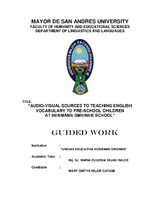Mostrar el registro sencillo del ítem
Audio-visual sources to teaching english vocabulary to pre-school children at Hermann Gmeiner School
| dc.contributor.author | Hilari Cayami, Mary Cintya | |
| dc.contributor.author | Sejas Ralde, María Eugenia (Tutora) | |
| dc.date.accessioned | 2018-05-25T15:36:51Z | |
| dc.date.available | 2018-05-25T15:36:51Z | |
| dc.date.issued | 2009 | |
| dc.identifier.citation | Lenguas Extranjeras. Inglés | es_ES |
| dc.identifier.uri | http://repositorio.umsa.bo/xmlui/handle/123456789/16216 | |
| dc.description.abstract | This project is based on a branch of Audio- Lingual approach, then the research mainly focused on introducing rudimentary English vocabulary led to pre-scholar children using of Audio-visual aids. Because according to Shelley: 2005 human beings remember only 10% percent of what they read, but they remember 50% percent of what they see and hear, talking about English as a foreign language students can associate image with word, they can reproduce the weird sounds easily (which do not belong to Spanish phonetic pattern) in order to get correct pronunciation and to acquire basic English vocabulary. The study has been taken at Hermann Gmeiner School part of homeless children S.O.S., this school has an agreement with Mayor de San Andrés University and both institutions show their needs which can summarize in getting an English teaching- learning process. This project will take as study’s subjects to Pre-scholar children, because they are still using their individual, innate language learning skills to acquire their mother tongue and they can also use these skills to take English. And other reason is because in this stage children learn through play with fun activities. They take the language by being part in an activity shared with an adult, they make sense of the activity and get meaning from the language shared by an adult. When monolingual children reach puberty and become more self-conscious, their ability to take language diminishes and they feel they have to consciously study. English Language Learning in pre-scholar children is the answer to a very strong social pressure that is not free from difficulties or risk of failure. However, this project demonstrates that it is possible to achieve successful results from pre-scholar children without having to follow complicated and expensive proposal. | es_ES |
| dc.language.iso | en | es_ES |
| dc.publisher | Universidad Mayor de San Andrés. Facultad de Humanidades y Ciencias de la Educación. Carrera de Lingüística e Idiomas | es_ES |
| dc.subject | INGLÉS - ENSEÑANZA | es_ES |
| dc.title | Audio-visual sources to teaching english vocabulary to pre-school children at Hermann Gmeiner School | es_ES |
| dc.type | Thesis | es_ES |

